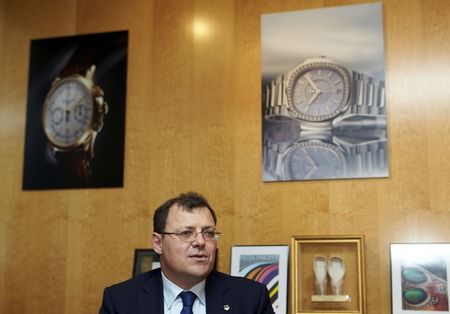GENEVA (Reuters) - Patek Philippe, celebrating its 175th anniversary and one of Switzerland's last family-owned watch brands, vowed to defy a wave of consolidation to stay independent for "at least another 25 years".
French luxury players LVMH (PA:LVMH) and Kering (PA:PRTP) have made acquisitions to enable them to compete with industry majors Swatch Group (VX:UHR) and Richemont (VX:CFR).
Kering snapped up Patek Philippe's smaller rival Ulysse Nardin in July. Only a handful of more sizeable independent companies remain, among them Rolex, Chopard, Audemars Piguet and Patek Philippe.
"We've made all the arrangements to make sure Patek Philippe stays independent for at least another 25 years," Honorary Chairman Philippe Stern told 300 guests at an anniversary party at the company's headquarters in Geneva on Monday night.
His son, Thierry, the current chairman, added: "And hopefully for much longer."
The company traces its roots to Polish watchmaker Antoine Norbert de Patek who set up his workshop in Geneva in 1839. It is known for highly technical and elegant watches, costing up to millions of dollars for the rarest pieces.
TAX FEARS
On Monday night, the brand unveiled a special anniversary edition, the Grandmaster Chime, a double-face wristwatch with five chiming functions.
Analysts estimate Patek Philippe's annual brand sales at around 1 billion Swiss francs (659,733 million pounds).
Thierry Stern said in an interview with Reuters on Monday that sales this year would be similar to last year, or slightly higher.
He also aired his concern over tax rates. The canton of Geneva, where Patek's headquarters are located, has some of the highest tax rates in the country.
"I have built financial reserves to save Patek when times get really tough. We cannot afford to pay always more and more (taxes)," Stern said.
In a newspaper interview a few months ago, Stern had threatened the group might have to leave Geneva if the tax burden continued to increase.
"That was a warning shot. We're a big company owned by a single shareholder and we wanted politicians to be aware of the risks," he said.
He said he didn't believe strict quotas for cross-border commuters -- part of a package of measures to be implemented after February's popular vote to curb immigration -- would ever see the light of day.

"That is simply not possible, we would have to close shop. Half of our workers are commuting from France," Stern said.
(Reporting by Silke Koltrowitz; editing by Keith Weir)
